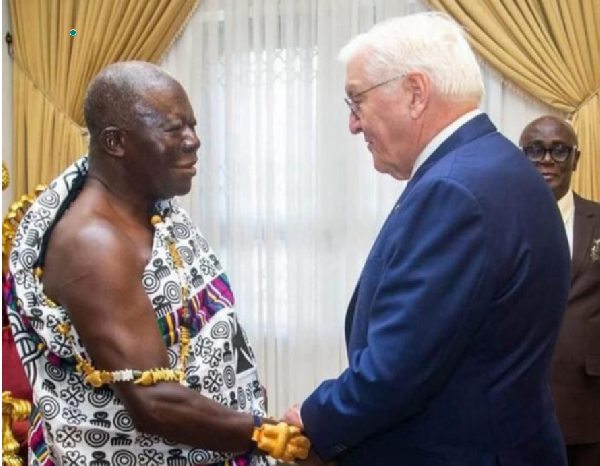The recent visit of the President of the Federal Republic of Germany to Ghana, including his courtesy call on Otumfuo Osei Tutu II, the Asantehene, reflects the multidimensional character of contemporary diplomacy.
This event highlights the intersection of bilateral relations, economic diplomacy, and cultural diplomacy in advancing mutual interests and fostering understanding between Germany and Ghana.
This essay examines the relevance of these diplomatic dimensions, emphasizing their role in promoting sustainable partnerships and reinforcing cultural and economic collaboration between the two nations.
Bilateral Relations Between Germany and Ghana
Germany and Ghana share a longstanding and dynamic bilateral relationship rooted in mutual respect, cooperation, and shared democratic values.
Historically, the connection between both nations extends back to pre-independence periods, with relations evolving significantly after Ghana attained independence in 1957.
Over the decades, the partnership has expanded to encompass political dialogue, trade, security cooperation, and development assistance.
Politically, Germany recognizes Ghana as a key partner in West Africa—particularly for its political stability, adherence to democratic governance, and regional peacebuilding efforts.
Through institutions such as the German Agency for International Cooperation (GIZ) and the KfW Development Bank, Germany has supported Ghana in sectors including governance, education, renewable energy and infrastructure development.
These initiatives reinforce the strategic importance of Ghana as a regional hub for Germany’s engagement in Africa.
Consequently, the German President’s visit reaffirms both countries’ commitment to deepening cooperation and strengthening their shared democratic and developmental objectives.
Economic Diplomacy as a Pillar of Engagement
Economic diplomacy remains central to Germany’s foreign policy approach toward Ghana.
The visit by the German President signifies a mutual desire to enhance trade and investment relations within frameworks such as the G20 Compact with Africa (CwA), which promotes private investment and economic reform in partner African countries.
Germany is one of Ghana’s leading European trading partners, and bilateral trade continues to expand, particularly in areas such as manufacturing, renewable energy, digital technology, and industrialization.
Through initiatives like the Ghanaian-German Centre for Jobs, Migration, and Reintegration, Germany has demonstrated a commitment to supporting job creation, entrepreneurship, and skills development in Ghana.
This aligns with Ghana’s own economic agenda to promote industrialization and reduce youth unemployment.
Additionally, Germany’s expertise in renewable energy and digital innovation complements Ghana’s developmental goals in energy transition and green economy advancement.
The President’s visit, therefore, underscores the strategic role of economic diplomacy in facilitating sustainable development and shared economic prosperity between the two nations.
Cultural Diplomacy and the Courtesy Call on Otumfuo Osei Tutu II
Cultural diplomacy plays an equally vital role in international relations by fostering mutual understanding, respect, and reconciliation between nations.
The German President’s courtesy call on Otumfuo Osei Tutu II, the Asantehene, symbolizes deep recognition of Ghana’s cultural heritage and the enduring influence of traditional authority in the nation’s governance structure.
The Asantehene, as custodian of one of Africa’s most historic kingdoms, embodies Ghana’s identity, unity, and continuity.
This engagement serves as an acknowledgment of the importance of traditional diplomacy within contemporary international relations.
By paying homage to the Asantehene, Germany demonstrates respect for Ghana’s indigenous institutions, signaling that diplomacy extends beyond state-to-state interaction to include cultural and traditional actors.
Moreover, cultural diplomacy between Ghana and Germany has gained prominence in recent years through collaborative efforts in repatriating cultural artifacts taken during the colonial era.
The courtesy call thus symbolizes an ongoing process of cultural restitution, reconciliation, and mutual respect between the two nations.
Furthermore, cultural diplomacy extends to educational exchanges, academic partnerships, and people-to-people initiatives that promote intercultural dialogue.
German institutions such as the Goethe-Institute play an instrumental role in promoting linguistic and cultural exchange in Ghana, further strengthening interpersonal connections that underpin formal diplomatic relations.
Symbolic and Diplomatic Significance of the Courtesy Call
The courtesy call on Otumfuo Osei Tutu II carries profound symbolic and diplomatic implications.
It reflects Germany’s acknowledgment of the dual governance structure in Ghana, where traditional authorities coexist with formal political institutions.
Such engagement fosters inclusivity in diplomacy and reinforces the role of subnational diplomacy, where traditional leaders contribute to peacebuilding, social cohesion, and cultural preservation.
Additionally, the visit enhances soft power relations, projecting Germany not only as an economic partner but also as a nation committed to mutual understanding and historical justice.
By engaging with traditional leadership, the German President underscores the evolving nature of diplomacy in the 21st century—where culture, identity, and community values are integral components of foreign policy.
Conclusion
In conclusion, the German President’s visit to Ghana, complemented by the courtesy call on Otumfuo Osei Tutu II, embodies the essence of modern diplomacy—integrating bilateral, economic, and cultural dimensions.
The visit reinforces Germany and Ghana’s shared commitment to democratic governance, sustainable development, and cultural understanding.
Through economic diplomacy, both nations seek to strengthen trade, investment, and innovation; through cultural diplomacy, they foster reconciliation, heritage preservation, and people-to-people connections.
Ultimately, this engagement exemplifies how diplomacy today transcends political agreements to embrace economic cooperation and cultural respect, laying a foundation for enduring and mutually beneficial relations between Germany and Ghana.

>
Lilian Afreh-Sika Boateng, Certified Economic Diplomat
